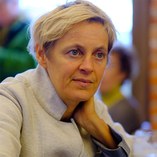Ann Buysse
Motivation
What is your main driver for doing research?
Keeping my mind sharp. For me, the foundation of science is incessantly questioning your theories, hypotheses and data. We make more progression in thought by challenging ourselves and our ideas than by confirming what we know. It is probably because of my bad memory for facts and figures - which makes me less suitable as knowledge hub - that I do value divergent perspectives and critical thinking so much. For me, connecting through a continuous and open dialogue with peers from different disciplines, stakeholders, policy makers, citizens and society at large is a fundamental and the most rewarding part of doing science.
Why do you believe that strengthening mental health is so important?
Mental health implies the possibility to realise one’s full potential and contribute meaningful to society. For me that is the core of being human: to be able to make the difference, to be significant and to be recognized as meaningful by others. A lot of people suffer from ill mental health. They deserve a society that takes the best care possible for emotional, psychological and social wellbeing.
How could research change the world?
We are surrounded by evidence that research impacts all of our individual lives as well as our social progression as mankind: from the technology I use to write this sentence to the decoding of the ecological, political and social changes that happen around me. I think the critical, reflective stance and the progression in thought specific to research is especially relevant to deal with the grand societal challenges we currently face. But I also think that science will only be able to play it’s role in enlightening our lives and explaining our place in the world, if research does not happen in isolation but in an open interdisciplinary dialogue and a dialogie with society. It is in this connection that breakthroughs will be co-created.
With whom outside academia did you already collaborate and achieved important results?
I have had the pleasure to collaborate with a broad range of stakeholders, including civil society organisations (Sensoa, Gezinsbond, Rechtbanken), education and training organisations (schools, Vormingscentrum Opvoeding en Kinderopvang), (mental) health institutions (university hospital, hospitals, Centra Algemeen Welzijnswerk, Diensten Geestelijke Gezondheidszorg), interest groups (LGBT-organisations, Steunpunt Adoptie), policy makers (Minister of Welfare, Public Health and Family). Especially inspiring and refreshing for me was the meaningfull collaboration with non-scientists such as design thinkers, artists and citizens.
Publications
https://biblio.ugent.be/person/801000821628
